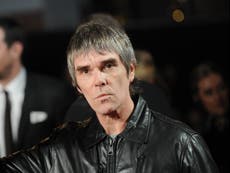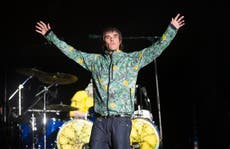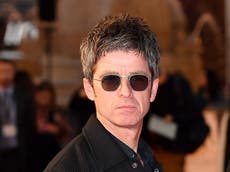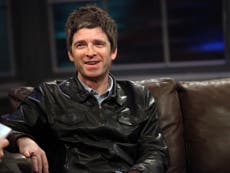The Britpop legends of my youth have got it very wrong on coronavirus
Ian Brown and Noel Gallagher were once my heroes, but I’m starting to realise having heroes is a fool’s errand

Your support helps us to tell the story
From reproductive rights to climate change to Big Tech, The Independent is on the ground when the story is developing. Whether it's investigating the financials of Elon Musk's pro-Trump PAC or producing our latest documentary, 'The A Word', which shines a light on the American women fighting for reproductive rights, we know how important it is to parse out the facts from the messaging.
At such a critical moment in US history, we need reporters on the ground. Your donation allows us to keep sending journalists to speak to both sides of the story.
The Independent is trusted by Americans across the entire political spectrum. And unlike many other quality news outlets, we choose not to lock Americans out of our reporting and analysis with paywalls. We believe quality journalism should be available to everyone, paid for by those who can afford it.
Your support makes all the difference.What is happening to the Britpop heroes of my youth? I just about managed to weather the unpleasant transition of Alex James from louche, foppish rake to exactly the sort of pseudo-aristocrat his band Blur lampooned in their 1995 hit “Country House”. Sandwiched somewhere in my musical development between Nirvana and cult Scottish popsters Bis, Blur were my teenage obsession. The day I saw their bassist scoffing cheese with David Cameron and Jeremy Clarkson was perhaps the exact moment I gave up on teenage dreams.
Spare a thought, then, for fans of The Stone Roses, who are currently seeing their frontman, Ian Brown – a man who was once so cool he could sing the lyric “I wanna be adored” without all that many people sniggering – spout so much tin-hatted, Covid-related codswallop on Twitter and beyond (Brown’s rambling, confused, scientifically demented anti-lockdown song “Little Seed Big Tree” was recently deposited on the internet). “I Wanna Be Adored”? Right now, Brown is on a mission to be abhorred. Brown thinks that Covid was “designed”. That it exists to “control” us. He tweets this from an iPhone, a device that recognises your face, your voice and your fingerprint.
And what of Noel Gallagher, he of Oasis and little brother baiting fame, who’s recently stated that he refuses to wear a small piece of cloth on his face. “I choose not to wear one and if I get the virus it’s on me, it's not on anyone else,” says the guitarist, like a man whose just emerged from a Russian gulag and missed the not insubstantial amount of literature on the many reasons why face masks are required at this present time.
“There’s too many liberties being taken away from us now,” he continues. This statement will likely feature on future pub quizzes. “In 2020, what injustice did Noel Gallagher use his massive platform to rail against? Was it A) discrimination against people of colour? B) The rapid rise of transphobia? Or C) The right to make your grandma poorly because he’s too selfish to put a mask on for five to ten minutes in Tesco?”
I loved both of these men as a teenager. I didn’t mind that Brown sang like a rusty vuvuzela, a sperm whale giving birth, or like a manatee waking up from a coma. He and his band were cool. So were Noel and his. Charisma – especially when aligned with the sort of wistful or energised indie pop peppered across both bands’ classic debuts – can paper over cracks like nothing else.
And, I didn’t mind that Gallagher – also from Manchester, at this point Shaun Ryder is the only pop star from said city left to believe in – didn’t have many original ideas to call his own. I grinned and bore it – aka, went to the bar – when he’d temper Oasis gigs by interrupting the furious rock’n’roll that made the band so vital upon arrival by pulling up a stool and playing bland, busker night-esque acoustic piddle.
Few events in my life have seared themselves into my consciousness like the first time I heard “Live Forever”. I was fourteen and bored. By the end of the song I felt like my heart had been doused with petrol and set alight. Looking back, I could have just taken a Rennie – and yet I can’t imagine how much more dull and listless my teenage years would have been without Noel’s songs.
Neither of these men are stupid or especially unkind. The Stone Roses’ decision – after ending a long media blackout in 1994 with Second Coming and their return – to give their comeback interview not to the NME as expected, but to The Big Issue, is an act that remains one of the coolest in the history of pop.
Brown’s 2007 single “Illegal Attacks”, a mediation on the UK and USA’s involvement in Iraq and Afghanistan, with the great Sinead O’Connor on guest vocals, is one of a handful of times that Noughties indie stepped up to the plate and delivered a protest song that didn’t embarrass itself.
My disappointment is possibly greater in the case of Noel. Brown has form when it comes to crackpot, fag packet philosophy. “I don't trust the British fascination with homosexuals,” he told the now sadly defunct music paper Melody Maker in 1998. “Violence comes from Romans, Nazis, Greeks – they were all homosexual.” But Noel? Sure, the guy could write a helluva tune – or at least repurpose someone else’s – but part of his appeal was his wit, his charm, his wry observation of nonsense and hypocrisy. As a teenager I found Noel Gallagher hugely inspiring. He came from a crap northern suburb. So did I. "D’ya Wanna Be A Spaceman?" sang Noel in those early, halcyon days. Well, not really, Noel, but I would like more from life than is expected of me. Noel showed me how.
Maybe I’m too old for heroes. Maybe I shouldn’t let their plummeting from their pedestals get me down. Maybe it’s time to let them go and stand on my own two feet. Or maybe it’s time to find out where Jarvis Cocker lives, strap him to a chair and gaffer tape his mouth just in case.





Join our commenting forum
Join thought-provoking conversations, follow other Independent readers and see their replies
Comments